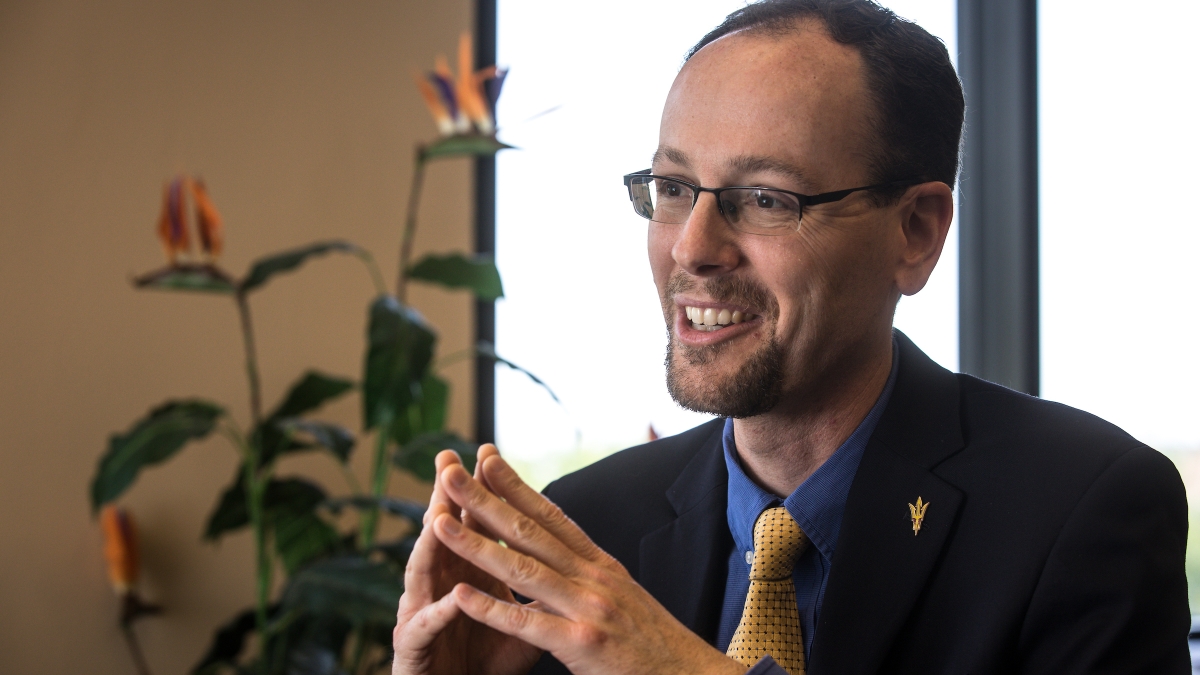When you’ve gotten used to waking up to your iPhone buzzing, asking Google every random question that pops into your head and relying on GPS to get around, it can be easy to forget how new it all is.
“We’ve come so far in developing technology so quickly,” said Todd Sandrin, that “the rate at which we can adapt to, comprehend and engage the solutions has plateaued a little bit.”
He wants to address that in his new role: dean and vice provost of ASU’s New College of Interdisciplinary Arts and Sciences.
“At New College and at West campus, we have an opportunity to rewire academia in the West Valley at a scale we haven’t seen before,” Sandrin said.
“When we think about changing the way the next generation thinks about and solves problems, ensuring they’re critical thinkers, adaptable learners, flexible lifelong learners, we’ve got all the raw ingredients right here.”
Sandrin said his biggest challenge will be thinking about how to “rewire the academic institution in a way that allows human adaptability to be at the rate which it needs to be to allow all of humanity to use those wonderful technological devices and ideas to their maximal benefit.”
He’s not intimidated by the challenge, saying it’s something ASU and New College have already begun to do.
Sandrin will succeed Marlene Tromp as New College dean. He joined ASU in 2008 as associate director of the School of Mathematical and Natural Sciences after being lured away from a faculty position at the University of Wisconsin-Oshkosh by ASU President Michael Crow’s “grand idea” for a New American University.
“The idea of aligning what we do as an institution of higher education with what the world, with what society needs really attracted me,” Sandrin said. “President Crow’s vision of that alignment — and how it should come about, and how quickly it needed to come about — were really exciting to me, so I wanted to be a part of that.”
Most recently, Sandrin has served as associate dean of New College. He also has served as a professor of microbiology and as director of New College Undergraduate Inquiry and Research Experiences, which he founded in 2011. As its name suggests, NCUIRE provides New College undergrads the opportunity to engage in meaningful research partnerships with faculty and other undergraduates across the disciplines.
"Todd reflects the qualities of leadership we sought and the breadth of experience to lead the college to develop dynamic new initiatives, enhance the high quality of education offered to our New College students and grow the student enrollment," said Mark Searle, executive vice president and university provost.
Sandrin has been pleased with his work. At NCUIRE, students have published alongside world-class faculty in top-tier journals, and they’ve attended and presented at internationally recognized conferences.
Students who participate in NCUIRE have a 97 percent year-to-year retention rate, and transfer students who participate in NCUIRE have a 100 percent graduation rate — something that speaks to ASU’s commitment to access and to the value of a mentor-mentee relationship, Sandrin said.
There is no GPA requirement to participate in the program.
“As long as the student can articulate to a faculty member [what they’d like to research], and the faculty member says the student has the fire in their belly … we believe that’s the most important criteria,” he said. “And that, I believe, is why we see outcomes like that.”
Sandrin has mentored several NCUIRE students, working on research that looks at how to optimize microbial identifying technology. He and his students were able to take the process of identifying a germ and what drugs it is resistant to from several hours down to a few seconds.
Several hospitals, including ones run by Banner Health and the Mayo Clinic, use the methods they’ve developed, and it wouldn’t have been possible without interdisciplinary collaboration; Sandrin and his students worked with statisticians, an area life scientists don’t generally use, to help improve their process.
Being a mentor to students is a rewarding experience, Sandrin said.“What excites me sometimes most is to see them doing work they never knew they could do,” because it is “work which leverages the intersection between disciplines, that space where, for whatever reason, people have not yet looked for solutions.”
But for faculty and students at ASU, he said, it’s second nature.
“It’s what we do as an interdisciplinary group of scholars across ASU and certainly in New College,” he said. “It is what we’re trained to do.”
Sandrin said he is looking forward to serving as dean of New College but points out there are seven total colleges at ASU’s West campus, each of which complement each other and allow for collaboration across the disciplines.
“We have the interdisciplinary perspective, we have the expertise, we have the faculty who are committed to doing this on all fronts, and we have students that we are looking forward to serving.”
To learn more about New College and its 70-plus degree programs, click here.
Top photo by Charlie Leight/ASU Now
More Arts, humanities and education

ASU professor's project helps students learn complex topics
One of Arizona State University’s top professors is using her signature research project to improve how college students learn science, technology, engineering, math and medicine.Micki Chi, who is a…

Award-winning playwright shares her scriptwriting process with ASU students
Actions speak louder than words. That’s why award-winning playwright Y York is workshopping her latest play, "Becoming Awesome," with actors at Arizona State University this week. “I want…

Exceeding great expectations in downtown Mesa
Anyone visiting downtown Mesa over the past couple of years has a lot to rave about: The bevy of restaurants, unique local shops, entertainment venues and inviting spaces that beg for attention from…


